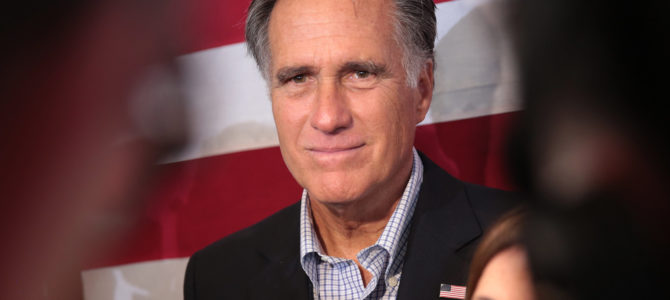
What does Mitt Romney stand for? Not what is he against — we know that — but does he stand for.
It’s a serious question: What motivates Mitt? Why did the junior Republican from Utah come to Washington? Was it for the military? Families? Business? Abortion? Guns? The old Reagan-Republican way? It’s truly hard to say.
He’s generally toed the line on the military, failing to distinguish himself as either a hawk or a dove. He sure likes his family, but he voted to shut down Catholic adoption in Massachusetts a full 13 years before President Barack Obama followed suit. He’s generally pro-business but no outspoken champion, and he actively opposed an Arizona law that protected religious business owners from having to violate their consciences. On abortion, he went after nuns for opposing it in Massachusetts (once again, before Obama made that policy popular), but voted against federal funding for abortion when he came to D.C. He’s gone back and forth on guns as well, and was actually against Ronald Reagan before he was for him.
See? This is hard work. When he launched his Senate bid two years ago this month, Romney touted his experience from the Winter Olympics, called Utah beautiful, lauded its character, expressed an open-armed embrace of immigrants, and made a promise: “If you give me this opportunity, I will owe the Senate seat to no one but the people of Utah.”
But the games were a long time ago. So long, the children conceived in its village would be able to enlist in the Marines if they survived Roe v. Wade. Later in his campaign for Senate, Romney claimed to be “more of a hawk on immigration” than Trump, though he’s since voted against funding for the border wall. Finally, it doesn’t really seem like he’s representing the people of Utah, who voted for Trump over Hillary Clinton by 18 points. Asking just shy of two dozen Senate staffers, reporters, and observers around town what they thought of the question, on background, the answers ranged from bewildered to hysterical to depressing.
So what has he really stood for? Well, the first thing he did when he got to town was write an oped for The Washington Post attacking Donald Trump — the only Republican president elected in the past 16 years and a political foe of the previous two candidates, including Romney. He got some great TV out of that.
He won for himself great expressions of fondness. He became popular — sort of — with a certain set, and boxed himself in. Romney went to Washington “for himself,” a former longtime Senate chief of staff succinctly replied to The Federalist when asked.
No doubt the press invites are pouring in. Indeed, he announced his decision to vote to impeach the president by giving three different reporters “exclusive” stories. What a guy, just breaking jealous boys’ hearts all across town.
But Utah voters might take notice: Precious few of the media who interview Romney today, tomorrow, or yesterday will ask him about the military, the economy, or social issues. Most invite him to hammer the president, and he obliges. “They’ll never let him do anything outside of being the Trump counterpunch, and he leans into it,” one Trump-skeptical, longtime Republican and conservative communicator told The Federalist.
So there: We’ve identified one thing the man who succeeded Sen. Orrin Hatch is for, and it’s positive media for Mitt Romney. He likes it when The New York Times and The Washington Post give him a tickle — a condition he shares with the arch-nemesis who got the job he coveted (and made more money than he did).
Discounting the partisan bluster filling the airwaves, there’s a more generous take out there — in a way. “He is a wealthy, healthy old man from a culture of service,” a Senate staffer who works closely with Romney’s office told The Federalist. “He is a true believer who is going to vote his conscience, but he also comes from a wealthier elite mindset that is not sympathetic to Trump or Trump voters.”
“Far as I read him, he’s attracted to praise and the power of high office,” a D.C. reporter said. “He was never really motivated by any particular political principle, though I think he’s generally pro-business. He’s always operated as though the existential threat of the left doesn’t exist and the current course is just fine with a little tweaking.”
“Norms, of course, are sacrosanct.”
“He went to Washington to do this,” a former longtime Senate communicator said, referring to the impeachment vote. “Mixture of anger and delusional self-righteousness. Funny thing is he probably thinks this will make him a more notable figure in history. Instead it just looks petty and makes him more of a footnote in political history.”
So it’s difficult to pin down what the man really is: The man who, when aiming for an administration job, said “President-elect Donald Trump is the very man who can lead us to that better future.”
“When I think of Mitt Romney,” the same reporter shared, “I think of modern corporate America: Sponsoring floats in the local gay pride parade so the worker bees keep working and don’t cause a kerfuffle.”
This article has been updated since posting.








